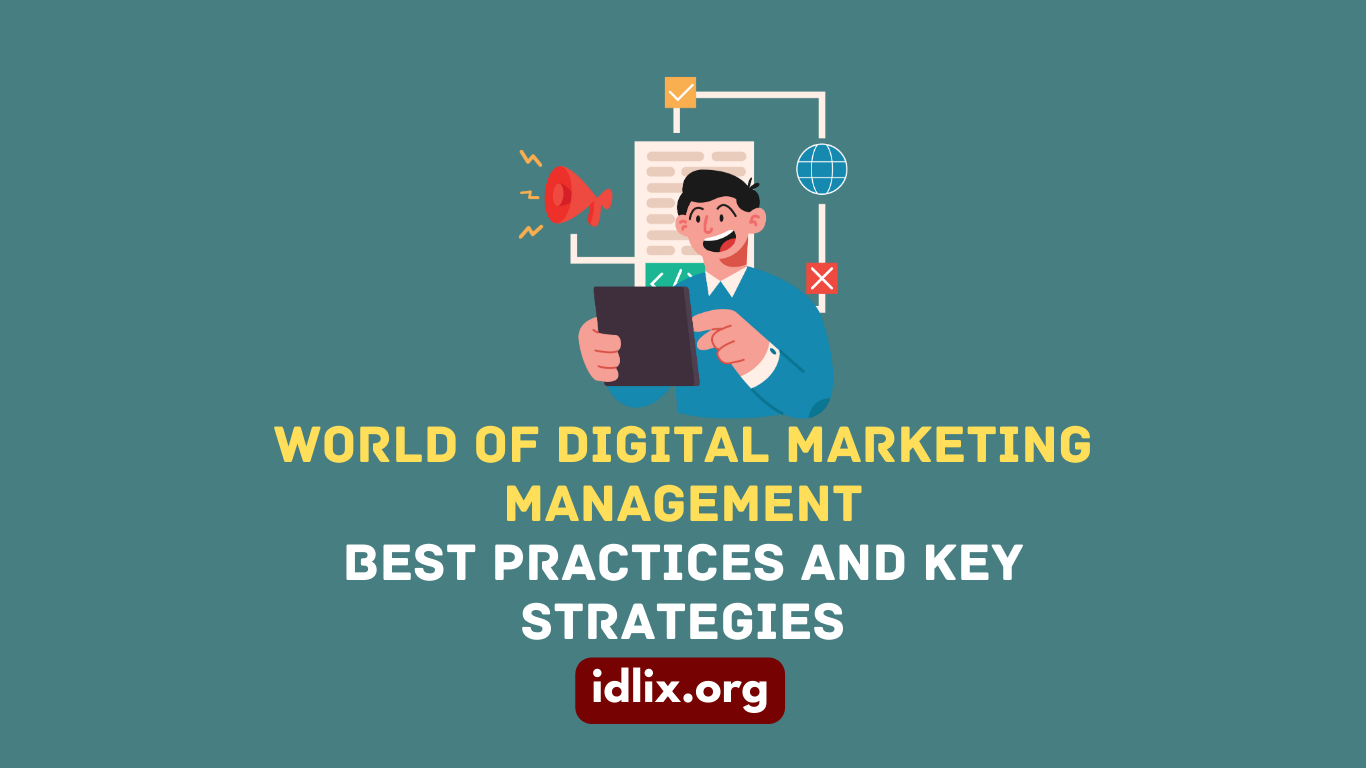idlix.org - Digital marketing has rapidly become a crucial component of business strategy in today's digital age. With the increasing importance of online presence and e-commerce, digital marketing management is essential for businesses to reach their target audience effectively.
Defining Digital Marketing Management
Digital marketing management refers to the process of managing an organization's digital marketing efforts. It involves developing and implementing digital marketing strategies to achieve business objectives, such as increasing brand awareness, generating leads, and driving sales. Digital marketing management includes a range of activities, including search engine optimization (SEO), social media marketing, email marketing, and content marketing.
Best Practices for Digital Marketing Management
1. Develop a Clear Strategy
A clear digital marketing strategy is essential for effective digital marketing management. This involves defining business objectives, identifying target audiences, and selecting the most appropriate digital marketing channels and tactics.
2. Focus on the Customer
Digital marketing management should focus on meeting the needs of the customer. This involves understanding their preferences, needs, and behaviors, and tailoring digital marketing efforts to meet their needs.
3. Use Data to Drive Decision Making
Data is a critical component of digital marketing management. By analyzing data on customer behavior, market trends, and digital marketing performance, businesses can make informed decisions about digital marketing strategies and tactics.
4. Be Agile and Adaptable
Digital marketing management requires flexibility and adaptabilityto respond to changing market conditions and customer needs. Businesses should be willing to adjust their digital marketing strategies and tactics as needed to stay ahead of the competition.
5. Measure and Monitor Performance
Measuring and monitoring digital marketing performance is essential for effective digital marketing management. This involves regularly reviewing analytics data and metrics, such as website traffic, click-through rates, and conversion rates, to evaluate the effectiveness of digital marketing efforts.
Key Strategies for Digital Marketing Management
1. Search Engine Optimization (SEO)
SEO is the process of optimizing a website to rank higher in search engine results pages (SERPs). This involves optimizing website content, metadata, and backlinks to improve visibility and attract more organic traffic.
2. Social Media Marketing
Social media marketing involves using social media platforms, such as Facebook, Twitter, and Instagram, to promote products and services, engage with customers, and build brand awareness. Social media marketing can be an effective way to reach a large audience and build relationships with customers.
3. Email Marketing
Email marketing involves using email to communicate with customers and prospects, promote products and services, and build brand loyalty. Email marketing can be a cost-effective way to reach a targeted audience and drive sales.
4. Content Marketing
Content marketing involves creating and sharing valuable, relevant, and engaging content to attract and retain a target audience. Content marketing can include blog posts, videos, infographics, and other types of content that provide value to the customer.
5. Pay-Per-Click (PPC) Advertising
PPC advertising involves paying for clicks on search engine ads or social media ads. This can be an effective way to drive traffic to a website and generate leads or sales.
6. Influencer Marketing
Influencer marketing involves partnering with influential individuals on social media to promote products and services. This can be an effective way to reach a targeted audience and build brand awareness.
7. Mobile Marketing
With the increasing use of mobile devices, mobile marketing has become an essential component of digital marketing management. This involves optimizing websites and ads for mobile devices and using mobile apps to reach customers.
8. Video Marketing
Video marketing involves creating and sharing videos to promote products and services, engage with customers, and build brand awareness. Video marketing can be an effective way to capture audience attention and communicate complex ideas.
Benefits of Effective Digital Marketing Management
Effective digital marketing management can provide numerous benefits for businesses. Here are some of the key benefits:
1. Increased Brand Awareness
Digital marketing management can help businesses increase brand awareness and build a strong online presence. By using digital marketing strategies and tactics, businesses can reach a wider audience and promote their brand to potential customers.
2. Improved Customer Engagement
Digital marketing management can improve customer engagement by providing valuable content, personalized messages, and interactive experiences. This can help businesses build relationships with customers and improve customer loyalty.
3. Higher Conversion Rates
Effective digital marketing management can lead to higher conversion rates, as businesses can use targeted messages and calls to action to encourage customers totake action, such as making a purchase or filling out a form.
4. Better Return on Investment (ROI)
By using data to drive decision making and regularly monitoring performance, effective digital marketing management can result in a better return on investment. By focusing on the most effective digital marketing strategies and tactics, businesses can optimize their marketing spend and achieve better results.
5. Competitive Advantage
Effective digital marketing management can provide a competitive advantage, as businesses that effectively use digital marketing strategies and tactics are more likely to outperform their competitors and achieve long-term success.
Digital marketing management is an essential component of business strategy in today's digital age. By developing clear strategies, focusing on the customer, using data to drive decision making, being agile and adaptable, and measuring and monitoring performance, businesses can effectively manage their digital marketing efforts.
By using key digital marketing strategies and tactics, such as SEO, social media marketing, email marketing, content marketing, PPC advertising, influencer marketing, mobile marketing, and video marketing, businesses can reach their target audience effectively and achieve business objectives. With effective digital marketing management, businesses can increase brand awareness, improve customer engagement, achieve higher conversion rates, achieve a better return on investment, and gain a competitive advantage.
Looking to take your business to the next level in the digital age, focus on effective digital marketing management and take advantage of the many benefits that digital marketing has to offer.
